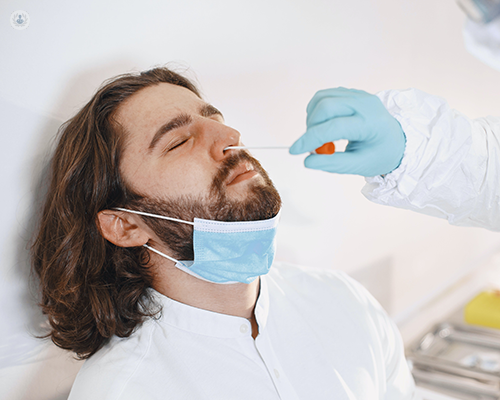Coronavirus (COVID-19) tests
What is analysed?
Coronavirus (COVID-19) tests analyse the presence of the virus SARS-CoV-2, which causes COVID-19.
COVID-19 tests include:
- The PCR (polymerase chain reaction) test: Analyses the genetic material of the SARS-CoV-2 virus. The test detects the presence of viral RNA to confirm an active infection.
- The antigen test: Analyses the presence of specific viral proteins (the nucleocapsid or spike proteins) from the SARS-CoV-2 virus.
- The antibody test: Analyses the presence of immunoglobulin M (IgM) and/or immunoglobulin G (IgG) antibodies in the blood, which are produced by the immune system in response to a past or current infection with the SARS-CoV-2 virus.

What does the result mean?
- The PCR test and the antigen test: The result indicates whether the patient is currently infected with the SARS-CoV-2 virus.
- The antibody test: The result indicates whether the patient has been exposed to the virus and has developed an immune response.
Why conduct the analysis?
- The PCR test: The test is conducted for the diagnosis of SARS-CoV-2 infection.
- The antigen test: The test is conducted for the detection of some of the proteins of the SARS-CoV-2 virus, indicating the presence of viral particles.
- The antibody test: The test is conducted for the detection of antibodies against SARS-CoV-2, which indicate that the patient has been previously infected with SARS-CoV-2.
When to conduct the analysis?
- The PCR test and the antigen test: The tests are conducted when symptoms of COVID-19 due to SARS-CoV-2, such as fever, cough, shortness of breath, loss of taste and smell, are observed. The tests may also be conducted when a patient with or without symptoms has been in contact with a patient who is infected.
- The antibody test: The test is conducted when a patient has had COVID-19 or suspects they may have had it and their doctor wants to confirm the presence of antibodies against the virus, especially if the patient was asymptomatic.
What sample is required?
- The PCR test and the antigen test: A respiratory sample, obtained through a nasal or throat swab, is required.
- The antibody test: A blood sample is required. The blood is drawn from a vein, usually in the arm.
Is any prior preparation necessary?
- The PCR test: No specific prior preparation is necessary.
- The antigen test: No specific prior preparation is necessary.
- The antibody test: Patients should fast for 8-12 hours before the blood sample is taken. In addition, patients should also inform a healthcare professional about any medications being taken, as they could affect results.
How is it performed?
- The PCR test: The sample is sent to a laboratory, where the viral RNA is extracted and amplified using the PCR technique allowing for the detection of viral genetic material.
- The antigen test: The sample is analysed on-site, using a lateral flow assay or other rapid testing methods.
- The antibody test: The sample is sent to a laboratory, where it is analysed to detect the presence of IgM and/or IgG antibodies.
What are the normal values?
- The PCR test: A negative result indicates no detection of SARS-CoV-2 RNA, suggesting no active infection or that the viral load is below the detection limit.
- The antigen test: A negative result indicates no detection of SARS-CoV-2 antigens, suggesting no active infection or that the viral load is below the detection limit.
- The antibody test: A negative result indicates no detectable antibodies, indicating no past infection or immune response.
What does having altered values mean?
- The PCR test: A positive result indicates the presence of SARS-CoV-2 RNA, showing an active COVID-19 infection.
- The antigen test: A positive result indicates the presence of SARS-CoV-2 antigens, indicating an active COVID-19 infection.
- The antibody test: Positive IgM and IgG results indicate a combined immune response. A positive IgM result indicates a recent or ongoing infection, whilst a positive IgG result indicates a past infection.